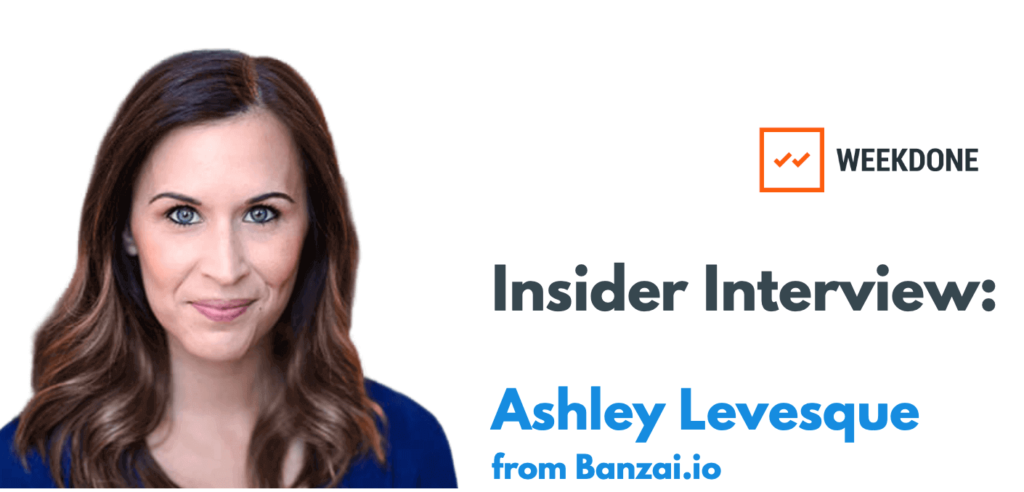As a team manager, do you ever consider yourself in the field of “people management” rather than project management? If not, let’s think of it now! Ask yourself what kind of impact you have on your team members.
Quickly imagine the best manager, mentor, or role model you’ve had in any area of your life. What qualities made them so influential to you? Chances are, they saw you as an individual – rather than a task to check off the list.
Today, we share a great interview with Ashley, VP of marketing with Banzai.io. Banzai is the virtual event platform built specifically for marketers. Their mission is to make marketing more human, flip the script on robotic marketing and empower marketers to feel impactful and get promoted.
Ashley is the perfect person to chat with us about what it takes to lead people, not just processes. Let’s get to the good stuff.
From your experience, what differentiates a leader from a manager?
Ashley: I use Brene Brown’s definition of leader, which is anyone who takes responsibility for finding the potential in people and processes, and who has the courage to develop that potential. The two key elements in this definition that differentiate leaders from managers are potential and courage.
A manager delegates work responsibilities to make sure all tasks are covered. A leader takes risks in an effort to develop not only the tasks around them, but the people as well.
That is such a great definition – thank you! What are the processes that a leader has to manage during a typical work week?
Ashley: Leaders show up at all levels of an organization, from interns to the c-suite, so the processes they are responsible for, will vary greatly.
However, one common element I find in all leaders is their ability to lead by influence, rather than authority.
Can you give an example of how a leader can influence people?
Ashley: The most effective leaders don’t avoid hard conversations, but rather enter into them with vulnerability and respect, creating a space for shared trust and honesty. These leaders lead with curiosity, encouraging teams and individuals not to rush into unsustainable solutions when something goes wrong, but rather to align first on problem identification and then move forward to solving.
They are committed to celebrating risks and championing bold ideas, which cultivates a culture of innovation and flexibility. By doing all of the above, leaders get to know the people they are working with, and are able to better connect with them. You can’t lead people if you aren’t connected.
What are some key leadership characteristics that someone can exercise now if they want to grow into a management/leadership position?
Ashley: Practice vulnerability. Notice I’m saying practice. Of course it may not be natural to you and of course you may not currently be doing this – that’s why it’s a practice.
Vulnerability enables you to be the courageous leader you are required to be, in order to effectively lead your team.
Leaders don’t have all the answers – but they ask great questions. They remain curious, and open, and in no way assume a monopoly on the truth.
Once you recognize that fear is the central emotion at the heart of most problematic behaviors in your organization, vulnerability and courage become the answer.
So, what do you think about the fear that stems from “imposter syndrome”? How can people be brave in overcoming the feeling that they’re unable to handle these big challenges required in a leadership position?
Ashley: The definition of being brave is feeling scared, and choosing to do it anyway. Feeling brave will not come when you’re fearful. Bravery is an action, not a feeling. So if you sit around waiting for it to come to you, you’ve missed your moment.
Decisiveness is a helpful guide in crawling out of your imposter hole. And remember that leadership doesn’t mean having all the answers, it means asking great questions – so your bravery may come in the form of:
- asking for help,
- asking for resources,
- questioning or challenging a decision or policy,
- asking for clarification when you’re confused,
- or playing the five “why”s.
Imposter syndrome comes when we silo ourselves on an island, surrounded by a moat of our own expectations. Set yourself up with resources so you aren’t alone on your island. Figure out if you can recalibrate expectations.
Lean into your fear!
I hope this interview inspired you like it did for us! Let’s all lean into the challenges that scare us – because often times, that’s where the growth happens!
We had such an insightful chat with Ashley and are so grateful for her time and leadership tips! If you’re in the field of marketing, be sure to check out Banzai.io to learn more about their offerings.
Head over to Team Compass to learn more about how to lead people rather than micromanage projects!

